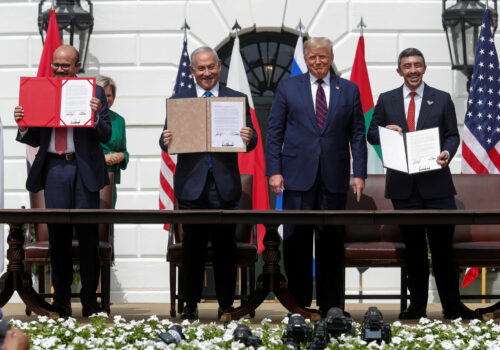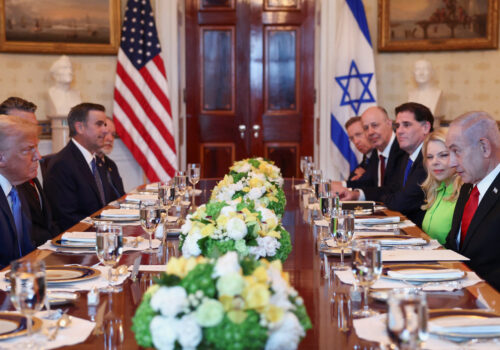There is a way forward for a two-state solution, if Palestinian leaders embrace the Abraham Accords
When the Abraham Accords were signed nearly five years ago, Palestinian leaders denounced the Accords as an abandonment of the Arab Peace Initiative, which conditions normalization with Israel on a just resolution to the Israeli-Palestinian conflict. The Palestinian Authority (PA) recalled its ambassador from Abu Dhabi in protest and turned down aid offers from the United Arab Emirates (UAE). But now, amid growing internal demand for reform of the PA, Palestinian leaders have an opportunity to leverage the Abraham Accords to promote positive reform and strengthen relations with regional partners.
A personal perspective
As a former Knesset member, I was one of the few Arab politicians in Israel to publicly support the Abraham Accords. I participated in official meetings with Emirati delegations and witnessed firsthand the potential for cultural and economic collaboration. These meetings highlighted the opportunity for Palestinian citizens of Israel to act as a bridge between the region’s people.
One such example was the 2020 pipeline deal between Israel’s EAPC and the UAE’s Med-Red company. Though the agreement faced domestic Israeli criticism, including opposition from Minister Tamar Zandberg, quiet diplomacy helped turn confrontation into conversation. I was able to leverage my relationships with stakeholders in both countries to encourage dialogue, with Zandberg meeting with the UAE ambassador in Israel in a constructive engagement.
While any future efforts to strengthen Palestinian engagement related to the Abraham Accords are sure to face significant challenges and criticism, I believe that over time, the practical benefits such engagement offers can overcome these challenges.
Pressure for PA reform
France and Saudi Arabia both recently renewed efforts to reform the PA, as part of a broader attempt to promote a two-state solution. Both French President Emmanuel Macron and Saudi Crown Prince Mohammed bin Salman understand that any political process that emerges from a Gaza cease-fire will require much more effective Palestinian leadership and are seeking to take steps now to get the PA closer to that point. Toward this end, Saudi Arabia and France declared a high-level conference at the United Nations (UN) headquarters. Ahead of the conference, Macron announced that France will recognize a State of Palestine at the UN General Assembly in September.
Also leading into the conference, PA President Mahmoud Abbas sent a letter to the French and Saudi governments that included a condemnation of the October 7 attacks, called on Hamas to release all hostages, and pledged to hold elections and advance reforms. Abbas also outlined an ambitious agenda aimed at promoting reforms in governance, economic transparency, and the empowerment of women and youth within the Palestine Liberation Organization (PLO) Central Council.
SIGN UP FOR THIS WEEK IN THE MIDEAST NEWSLETTER
He further detailed three significant initiatives: First, Abbas announced plans to abolish the existing law providing support to prisoners incarcerated in Israel and their families, replacing it with a social support mechanism based on families’ socioeconomic needs. His intention to place this mechanism under international supervision marks one of the most significant policy shifts in PLO history regarding prisoners’ families. Second, Abbas committed to revising school curricula to ensure it is “free from incitement according to the UNESCO standards” while also calling for reciprocity from Israel. Finally, he appointed longtime adviser Hussein al-Sheikh as the first-ever vice president of the PLO—a move interpreted as a step toward eventual succession for Abbas, who has been in office since 2005.
Together, these developments suggest a notable shift in governance in Ramallah and may signal the PA’s readiness for more productive international engagement. As the Arab members of the Abraham Accords continue to express their commitment to a two-state solution, constructive diplomacy with Palestinian leadership can serve as a meaningful trust-building measure even in the absence of a final-status agreement.
In addition to international pressure for reform, there are emerging signals from within Palestinian society suggesting a desire to explore new approaches, including as it pertains to the Abraham Accords. The Wall Street Journal featured an opinion article in June highlighting how Sheikh Wadee’ al-Jaabari and four other clan leaders from Hebron signed a letter in recognition of Israel as a Jewish state. They expressed an intent to break away from the PA, establish an independent emirate, and join the Abraham Accords. Though Palestinian tribes later publicly disavowed the statement and figures such as Jaabari have limited popular legitimacy, the incident points to undercurrents of frustration with the status quo. It underscores that this rapidly evolving geopolitical environment could create an opportunity for Palestinian leadership to reevaluate whether a resistance-first strategy has yielded meaningful gains or has instead contributed to further isolation.
Looking ahead
The Palestinian leadership now faces a choice. It can continue to reject future arrangements, or it can see the Abraham Accords as an opportunity for strengthening regional and diplomatic engagement, consistent with the reforms being promoted by both international partners and domestic actors. Viewing the Abraham Accords as a potential pathway, not an obstacle, could enable deeper and more constructive engagement. This may present a meaningful opportunity to advance the Palestinian national aspiration within the framework of a two-state solution. Time is of the essence. The current geopolitical landscape presents significant challenges for the Palestinian leadership. Israel is now led by a government that has been called the most right-wing administration in its history, and the full impact of the humanitarian crisis in Gaza has yet to unfold. Meanwhile, global attention is gradually shifting to other issues, away from the Israeli-Palestinian conflict.
Recently, Lana Nusseibeh, the assistant minister for political affairs and special envoy of the UAE minister of foreign affairs, presented a broad Emirati vision to address what she described as “systemic failures” in the region. She emphasized the UAE’s support for establishing a “viable Palestinian state alongside a secure Israel.” In this context, Abraham Accords countries could play a meaningful role in encouraging the PA through political and economic incentives, within a regional and international framework, to pursue a gradual diplomatic track that could lead to formal engagement with the Accords.
To strengthen the PA’s regional engagement while supporting regional stability, regional leaders should consider the following policy recommendations:
- Expand economic partnerships. Encouraging joint economic initiatives in areas such as agri-tech, water technology, tourism, and renewable energy can serve as trust-building measures. Ultimately, these projects would reduce Palestinian economic dependence on Israel and increase cooperation with Arab states that have normalized relations with Israel.
- Establish a dedicated diplomatic unit for engagement with Abraham Accords countries. Establishing an official liaison office within the PA could help coordinate regional diplomatic efforts, expand bilateral relations, and ensure that Palestinian perspectives are raised in regional normalization discourse. This would support a more strategic and consistent approach to regional diplomacy.
- Advocate for PA participation in regional multilateral forums related to the Accords. Abraham Accords countries, along with international partners such as the United States and European Union, could support the inclusion and representation of the PA in regional multilateral initiatives such as conferences on climate change, healthcare innovation, and digital infrastructure related to the Accords. This would advance a broader Palestinian participation in regional discourse around issues of shared interest and concern.
- Resume negotiations related to normalization. Prior to October 7, 2023, the PA was actively engaged in discussions with Saudi Arabia over the “Palestinian component” of a Saudi–Israel normalization deal. That engagement reflected a constructive approach to expanding the Abraham Accords. With Saudi Arabia taking on a leading role in discussions on Palestinian governance and postwar reconstruction in Gaza, the PA should seize the opportunity to reengage Riyadh on its plans to normalize relations with Israel in an effort to shape its role in any future regional agreements. In 2023, significant efforts were underway to incorporate the PA into the Negev Forum. A ministerial meeting of the forum had been scheduled for October 2023, but the events of October 7 led to its postponement. In light of recent substantial geopolitical shifts in the region, there is renewed optimism that the activities of the Negev Forum will resume, with the inclusion of the PA as part of the process.
- Establish Track II dialogue channels. Nongovernmental dialogue efforts involving Palestinians, Israelis, and Abraham Accords members, facilitated by academic institutions or think tanks, could serve to address sensitive issues within an informal dialogue process. This can serve as a platform for engagement around issues such as political perceptions, cultural misconceptions, or economic integration.
Despite what the constant headlines may imply, a two-state solution is not out of reach. By collaborating with regional partners and taking incremental steps within the framework of the Abraham Accords, the PA can move closer to realizing a Palestinian state.
Ghaida Rinawie Zoabi is a Palestinian-Israeli former politician who served in the Israeli Knesset from 2021 to 2023 as the first Arab woman deputy to parliament chair.
Further reading
Thu, Aug 7, 2025
Why Gaza’s post-Hamas future depends on its Arab neighbors—not just Israel
MENASource By
The international community is likely to support—both ideologically and financially—a local or Arab-led post-war solution for Gaza.
Thu, Jul 17, 2025
Five years on, the Abraham Accords need a multilateral mission
MENASource By
As the Trump administration pushes for “commerce, not chaos” in the region, the Abraham Accords ideology is the most powerful tool to achieve that goal.
Sat, Jul 12, 2025
Netanyahu’s trip to Washington ends with conflicting signals
MENASource By Daniel B. Shapiro
The moment of truth may yet come when Trump’s leverage on Netanyahu, which is considerable, may not be expressed only in private settings.
Image: Palestinian Prime Minister Mohammad Mustafa shakes hands with President Mahmoud Abbas, as they attend a swearing-in ceremony with the newly formed cabinet, in Ramallah, in the Israeli-occupied West Bank, March 31, 2024. REUTERS/Mohammed Torokman



